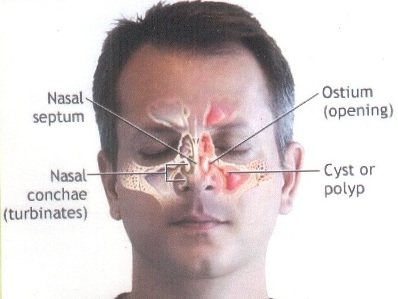Sinusitis A Persisting Nasal Ailment
- You get up in the morning feeling lousy, with a heavy head.
- You want to sleep all the time.
- You cough and sneeze and are tired and achy.
- You think that you might be getting a cold.
- To add to your irritation, the medicines you’ve been taking are not working.
- You finally seek Doctor’s advice.
- Doctor, after listening to your history of symptoms examining you, and perhaps doing a sinus X-ray, says you are diagnosed with Sinusitis.
Sinusitis: Sinusitis is an infection of the Para-nasal sinuses that occurs due to obstruction. Among the many causes of such obstruction or congestion are common cold, allergies, certain medical conditions, and abnormalities in the nasal passages. The human skull contains four major pairs of hollow air-filled- cavities called sinuses. These are connected to the nose and the nasal passage. Sinuses help insulate the skull, reduce its weight, and allow the voice to resonate within it. The four major pairs of sinuses are:
- Frontal sinuses
- Maxillary sinuses
- Tthmoid sinuses
- Sphenoid sinuses
If the normal defenses are disrupted, they may allow bacteria normally present in the nasal passages to enter any of the sinuses. Once there, the bacteria may stick to the lining cells and cause a sinus infection.
Development of Sinusitis:
- Mucous drainage and airflow are blocked.
- Secretions build up, encouraging the growth of certain bacteria.
- The resulting infection, swelling, and inflammation create further blockage, which may cause the sinuses to close up completely.
Different Categories:
- Acute Sinusitis: It is the most common form. Nearly everyone experiences it at one time or another. It usually lasts less than eight weeks or occurs no more than three or four times per year with each episode lasting no longer than 10 days.
- Recurrent Sinusitis: Defined as three or more sinus infections per year. These may be due to an incompletely treated chronic sinus infection, or new infections with different bacteria. It occurs more frequently but leaves no significant damage.
- Chronic Sinusitis: It lasts longer than eight weeks (12 or longer in children) or occurs more than four times per year (six times in children) with symptoms usually lasting more than 20days.
Causes of Acute Sinusitis:
- Virus: Most cases of acute sinusitis are caused by the common cold. Viral infections can paralyze or even destroy the cilia so that they are unable to move mucus out of the nose.
- Bacteria: If the sinus openings become blocked and the infected mucus cannot move out of the body or drain down the throat. It creates an ideal environment for bacteria to create an acid environment in the sinuses, which further destroys the cilia. The sinus openings become even more blocked.
- Fungus: Fungus is often seen as super added infection. Foreign objects: Young children sometimes try to put objects in their nostrils, and this can introduce bacteria into the sinuses.
- Medications: The side effect of certain medications contraceptives.
Causes of Recurrent Sinusitis
- Untreated acute sinusitis results in damage to the mucous membranes.
- Chronic medical disorders cause inflammation in the airways or persistent thickened stagnant mucous.
- Structural abnormalities.
Causes of Chronic Sinusitis :
- Narrow Sinuses : Some people simply have narrow sinus openings making it more difficult for air to pass through.
- Defective Mucous Membrane : Some people have poorly functioning mucous membranes, sometimes permanently damaged by a past infection.
- Dehydration : Without enough fluid in the body, the mucus will thicken, making it difficult for the cilia to move it through the sinuses.
- Poor Air Quality : Pollution, fumes, dust, smoke or crowded.
- Living conditions : anything that reduces the quality of the air.
- Weak Immune System : Immune deficiency can be caused by poor diet, medication side effects, or diseases such as HIV and AIDS.
- Hormones : In a few cases, hormonal imbalances can lead to sinusitis.
- Stress : Research shows that the mucous membrane and sinuses can react to stress.
- Tumors : One of the rarest causes of sinusitis are tumors.
Symptoms: Acute Sinusitis
- Facial pain and pressure over the involved sinus
- Drainage of a thick, yellow or greenish discharge from the nose or down the back of the throat
- Nasal congestion with discharge or postnasal drip (mucus drips down the throat behind the nose)
- Decrease in smell and taste sensations
- Pain, tenderness, swelling and pressure around your eyes, cheeks, nose or forehead
- Bad breath/bad taste
- Fatigue
- Cough, which may be worst at night
- Tooth pain
- Ear pressure/pain
Symptoms: Chronic Sinusitis
- Pain is worse in the late morning or when wearing glasses
- Discomfort or pressure below the eye
- Pain possibly worse with colds, flu, or allergies
- Persistent, low-grade headache in the forehead
- Ear pain
- Sore throat
- Bad breath (halitosis)
- Fatigue or irritability
- Nausea
Treatments:
- Acute sinusitis: If you have a simple sinus infection, Doctor may recommend treatment with decongestants and steam inhalations alone. Use of nonprescription decongestant nasal drops or sprays may also be effective in controlling symptoms. If antibiotics are administered they are usually given for 10 to 14 days. With treatment, the symptoms usually disappear and antibiotics are no longer required.
- Chronic sinusitis: Warm moist air may alleviate sinus congestion. Warm compresses are useful to relieve pain in the nose and sinuses. A vaporizer or inhaling steam from a pan of boiling water (removed from heat) may also help. Saline nose drops are also safe for home use.

